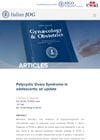Search
for
Sort by
Research
750-780 / 1000+ resultsresearch New-Onset Androgenic Alopecia Following Human Chorionic Gonadotropic Diet and Testosterone Pellet Implantation
The hCG diet and testosterone therapy can cause hair loss in some people.

research Exosomes Derived From Mouse Vibrissa Dermal Papilla Cells Promote Hair Follicle Regeneration During Wound Healing By Activating Wnt/β-Catenin Signaling Pathway
Mouse cell exosomes help hair regrowth and wound healing by activating a specific signaling pathway.

research Polycystic Ovary Syndrome in Adolescents: An Update
The document concludes that PCOS in teenagers is hard to diagnose, influenced by various factors, and should be managed with lifestyle changes and medication.

research Vitamin D Status in Polycystic Ovary Syndrome
People with polycystic ovary syndrome often have low levels of vitamin D.
research Mitochondrial Reactive Oxygen Species Promote Epidermal Differentiation and Hair Follicle Development
Mitochondrial reactive oxygen species are essential for skin and hair development.

research Chemical Composition and Biological Activities of Essential Oils of Curcuma Species
Essential oils from Curcuma species, like turmeric, have compounds that can fight inflammation, cancer, and bacteria, and can also stimulate hair regrowth in bald males.
research Hyaluronate Fragments Reverse Skin Atrophy by a CD44-Dependent Mechanism
Hyaluronate fragments can help reverse skin thinning by working with the CD44 receptor.
research Notch Signaling Regulates Late-Stage Epidermal Differentiation and Maintains Postnatal Hair Cycle Homeostasis
Notch signaling is essential for healthy skin and hair follicle maintenance.

research Telogen Effluvium: A Review of the Science and Current Obstacles
The document concludes that we need more research to understand Telogen Effluvium and find effective treatments.
research Pharmacological Efficacy of Tamarix Aphylla: A Comprehensive Review
Tamarix aphylla may be effective for various medical conditions, but more research is needed to confirm its safety and effectiveness.

research Biochemical and Structural Characteristics, Gene Regulation, Physiological, Pathological and Clinical Features of Lipocalin-Type Prostaglandin D2 Synthase as a Multifunctional Lipocalin
Lipocalin-Type Prostaglandin D2 Synthase (L-PGDS) is a protein that plays many roles in the body, including sleep regulation, pain management, food intake, and protection against harmful substances. It also affects fat metabolism, glucose intolerance, cell maturation, and is involved in various diseases like diabetes, cancer, and arthritis. It can influence sex organ development and embryonic cell differentiation, and its levels can be used as a diagnostic marker for certain conditions.

research The Role of Diet as an Adjuvant Treatment in Scarring and Nonscarring Alopecia
Certain diets may help with hair growth in people with different types of hair loss.

research Gene Network Analysis Reveals Candidate Genes Related to Hair Follicle Development in Sheep
Key genes crucial for sheep hair follicle development were identified, aiding fine wool breeding and human hair loss research.

research A Case of Acute Telogen Effluvium After SARS-CoV-2 Infection
COVID-19 may trigger sudden temporary hair loss.

research The Importance of Basonuclin 2 in Adult Mice and Its Relation to Basonuclin 1
Basonuclin 2 is vital for the development of facial bones, hair follicles, and male germ cells in adult mice, and its absence can lead to dwarfism and abnormal follicles.

research Toxicity of Repeated Oral Intake of Organic Selenium, Inorganic Selenium, and Selenium Nanoparticles: A Review
Eating too much selenium can cause bad breath, hair loss, and nail changes, with harmful effects starting at low daily doses.

research Cell Death in Skin Function, Inflammation, and Disease
Different types of cell death affect skin health and inflammation, and understanding them could improve treatments for skin diseases.

research Microbial Biosurfactant as an Alternative to Chemical Surfactants for Application in Cosmetic Industries in Personal and Skin Care Products: A Critical Review
Microbial biosurfactants could be a safer and environmentally friendly alternative to chemical surfactants in cosmetics.
research The Mouse Hairy Ears Mutation Exhibits an Extended Growth (Anagen) Phase in Hair Follicles and Altered Hoxc Gene Expression in the Ears
The mouse hairy ears mutation causes longer ear hair due to changes in gene expression.
research New Insights Into Testosterone Biosynthesis: Novel Observations From HSD17B3 Deficient Mice
Mice without the enzyme HSD17B3 still produce normal testosterone, suggesting they have different ways to make it compared to humans.
research Docosahexaenoic Acid Slows Inflammation Resolution and Impairs the Quality of Healed Skin Tissue
High DHA levels delay wound healing and worsen skin repair quality.

research Hair Tourniquet Syndrome of Penis: A Rare Situation in Boys with Serious Complications if Not Recognized
Hair wrapped tightly around a boy's penis can cause serious damage if not treated quickly.
research Cataracts and Strabismus Associated with Hand Rearing Using Artificial Milk Formulas in Bengal Tiger (Panthera Tigris Spp Tigris) Cubs
Tiger cubs fed artificial milk lacking certain amino acids developed eye problems and hair loss.

research Ectodysplasin A (EDA) Signaling: From Skin Appendage to Multiple Diseases
EDA signaling is linked to skin disorders, various cancers, and liver disease.

research Evaluating the Safety of Intravenous Delivery of Autologous Activated Platelet-Rich Plasma
Intravenous delivery of autologous activated platelet-rich plasma is safe.
research A Randomized Controlled Clinical Study of Acupuncture Therapy for Seborrheic Alopecia in Young and Middle-Aged Patients
Acupuncture may be a safe and cost-effective treatment for Seborrheic alopecia.
research The Role of the Gut Microbiome and Microbial Dysbiosis in Common Skin Diseases
Gut health affects skin diseases, and probiotics might help.

research SARS-CoV-2 Infection as a Trigger for Telogen Effluvium: A Literature Review with Case-Based Clinical Evaluation Guidance
COVID-19 can cause temporary hair loss, which is commonly reversible with treatment.

research Two Mutations at KRT74 and EDAR Synergistically Drive the Fine-Wool Production in Chinese Sheep
Two mutations in KRT74 and EDAR genes cause sheep to have finer wool.